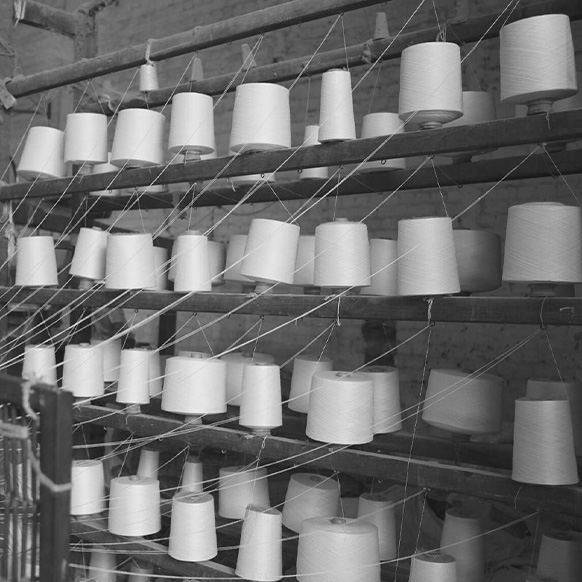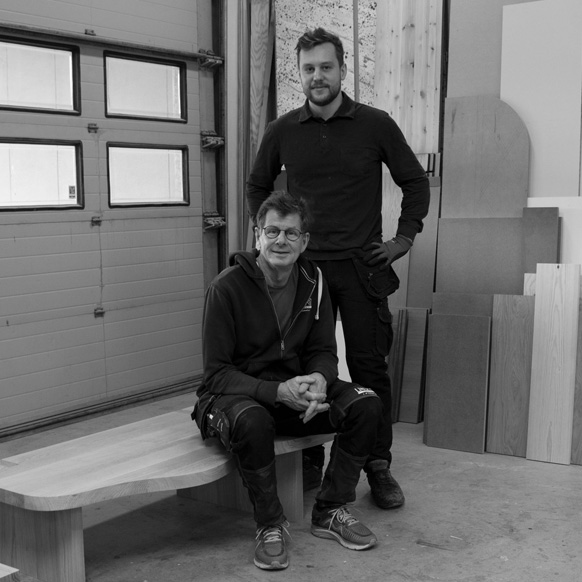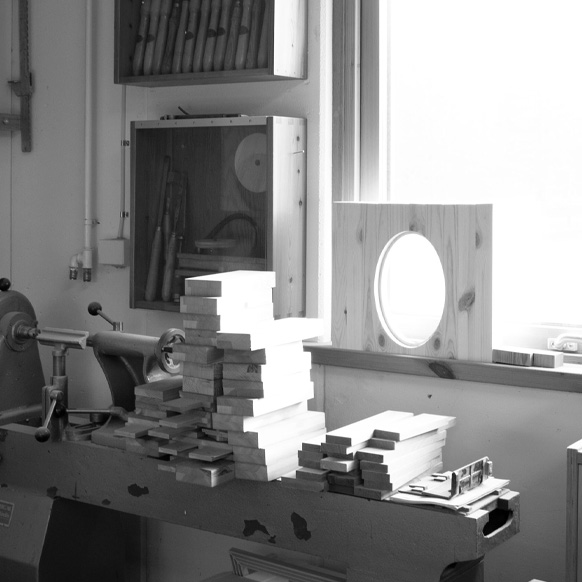SUSTAINABILITY
At Layered, we prioritize genuine craftsmanship, where circularity is an integral part of our design and production
process. We exclusively use 100% natural or recycled materials and strive to create durable products with
a long lifespan and circular properties.
To ensure the quality of our products, we conduct extensive testing that includes durability over time, color fastness
under various lighting conditions, fire safety, and chemical testing to guarantee that our products
are free from harmful substances such as BPA, formaldehyde, and quinoline. We also test fiber
content and conduct specific tests, such as phenolic yellowing for our white rugs.
Our sustainability icons
In addition to our quality controls, we are members of the GoodWeave organization and conduct regular audits to
ensure good working and environmental conditions among our suppliers. We also label our products with
sustainability icons on our website, so you as a customer can make conscious and informed choices.

Handmade
Artisan products. Since these products are made individually, each product is
unique and slightly different from each other.
Made in Europe

PRODUCTION PROCESS
Since we wove our first handmade rug in Bhadohi in 2015, sustainability has permeated our entire operation, from
material selection to production and supply chain. We value long-term business relationships and work closely with
our suppliers and production partners to always ensure the most sustainable practices possible. For example,
we strive for 100% renewable energy in our production.
Production
We collaborate with family-owned suppliers who have a long and proud tradition of craftsmanship in rug
productions. Our wool rugs are handmade in Bhadohi, India, which has been known for its handmade rugs
since the 1500s. Our shaggy rugs are made in Samarina, Greece, where Flokat rugs
have been woven for thousands of years.

Transport
To minimize our transport emissions, transportation is selected
based on the lowest carbon footprint when possible.
OUR FOCUS AREAS
To make the greatest possible impact on the environment and society within our operations, we focus on five main areas:
sustainable fibers, standardization, circular solutions, reduced plastic and chemical usage, and social responsibility (CSR).
We actively work to ensure sustainability both in production and for the people involved in it.

Sustainable fibers and materials
All our carpets are handmade from natural or recycled materials, where we strive to minimize the use of plastic and focus on clean fibers. Our viscose and Tencel carpets are made with certified Lenzing yarn*, and we use waste materials and unbleached wool to reduce waste and facilitate the reuse of fibers. Wool lasts a long time and maintains its quality over time. We avoid material blends whenever possible. By using natural materials like wool and cotton instead of polyester, we contribute to a safer work environment for our employees, who are spared exposure to synthetic materials and chemicals.
We also use FSC-certified wood in our furniture to ensure that the wood comes from responsibly managed forests. Additionally, we use high-quality fabrics that undergo the industry’s highest testing standards, maintaining a high standard for both quality and sustainability.
*Lenzing yarn is made from cellulose, a biodegradable component of natural wood, which can be returned to the ecosystem at the end of the fiber's life cycle.
Become more circular
Layered's products are designed to last over time, and we collaborate with selected partners to leverage their circular properties.Today, we are working with Mjuk in Sweden to offer a platform where our products can have a second life. Our products have
a high resale value, providing customers with an additional reason to invest in them. In Stockholm, we also collaborate with
professional rug cleaners to help our customers preserve the quality and lifespan of their rugs.
Reduced plastic and chemical usage
Eco-friendly packaging and reduced plastic usage are important focus areas for us, especially within our logistics.We use only recycled plastic and actively work to transition from recycled plastic to renewable packaging whenever possible.
Since 2020, we have removed all plastic from our sample packaging and replaced it with packaging made from FSC-certified
recycled paper. We have also eliminated printed information sheets in each package and reduced the size of the packages
to minimize the transport of air. Sample packaging accounts for as much as 40% of our outgoing shipments annually.
In addition to reducing plastic usage, we are aware that chemicals and dyeing impact the environment. Therefore, we strive to
use eco-friendly dyeing processes and minimize the use of harmful chemicals in our production. Our goal is to create products
that are not only sustainable in their design but also gentle on both people and the environment.
OUR CERTIFICATIONS

BSCI
Improve working conditions in the supply chain. BSCI audit helps a
business monitor its supply chain to ensure that all suppliers
are treating workers ethically and legally.
SUSTAINABILITY
At Layered, we prioritize genuine craftsmanship, where circularity is an integral part of our design and production process. We exclusively use 100% natural or recycled materials and strive to create durable products with a long lifespan and circular properties.
To ensure the quality of our products, we conduct extensive testing that includes durability over time, color fastness under various lighting conditions, fire safety, and chemical testing to guarantee that our products are free from harmful substances such as BPA, formaldehyde, and quinoline. We also test fiber content and conduct specific tests, such as phenolic yellowing for our white rugs.
Our sustainability icons
In addition to our quality controls, we are members of the GoodWeave organization and conduct regular audits to ensure good working and environmental conditions among our suppliers. We also label our products with sustainability icons on our website, so you as a customer can make conscious and informed choices.

Handmade
Artisan products. Since these products are made individually, each product is unique and slightly different from each other.
Made in Europe

PRODUCTION PROCESS
Since we wove our first handmade rug in Bhadohi in 2015, sustainability has permeated our entire operation, from material selection to production and supply chain. We value long-term business relationships and work closely with our suppliers and production partners to always ensure the most sustainable practices possible. For example, we strive for 100% renewable energy in our production.
Production
We collaborate with family-owned suppliers who have a long and proud tradition of craftsmanship in rug productions. Our wool rugs are handmade in Bhadohi, India, which has been known for its handmade rugs since the 1500s. Our shaggy rugs are made in Samarina, Greece, where Flokat rugs have been woven for thousands of years.

Transport
To minimize our transport emissions, transportation is selected based on the lowest carbon footprint when possible.
OUR FOCUS AREAS
To make the greatest possible impact on the environment and society within our operations, we focus on five main areas: sustainable fibers, standardization, circular solutions, reduced plastic and chemical usage, and social responsibility (CSR). We actively work to ensure sustainability both in production and for the people involved in it.

Sustainable fibers and materials
All our carpets are handmade from natural or recycled materials, where we strive to minimize the use of plastic and focus on clean fibers. Our viscose and Tencel carpets are made with certified Lenzing yarn*, and we use waste materials and unbleached wool to reduce waste and facilitate the reuse of fibers. Wool lasts a long time and maintains its quality over time. We avoid material blends whenever possible. By using natural materials like wool and cotton instead of polyester, we contribute to a safer work environment for our employees, who are spared exposure to synthetic materials and chemicals.
We also use FSC-certified wood in our furniture to ensure that the wood comes from responsibly managed forests. Additionally, we use high-quality fabrics that undergo the industry’s highest testing standards, maintaining a high standard for both quality and sustainability.
*Lenzing yarn is made from cellulose, a biodegradable component of natural wood, which can be returned to the ecosystem at the end of the fiber's life cycle.
Become more circular
Layered's products are designed to last over time, and we collaborate with selected partners to leverage their circular properties. Today, we are working with Mjuk in Sweden to offer a platform where our products can have a second life. Our products have a high resale value, providing customers with an additional reason to invest in them. In Stockholm, we also collaborate with professional rug cleaners to help our customers preserve the quality and lifespan of their rugs.Reduced plastic and chemical usage
Eco-friendly packaging and reduced plastic usage are important focus areas for us, especially within our logistics. We use only recycled plastic and actively work to transition from recycled plastic to renewable packaging whenever possible.Since 2020, we have removed all plastic from our sample packaging and replaced it with packaging made from FSC-certified recycled paper. We have also eliminated printed information sheets in each package and reduced the size of the packages to minimize the transport of air. Sample packaging accounts for as much as 40% of our outgoing shipments annually.
In addition to reducing plastic usage, we are aware that chemicals and dyeing impact the environment. Therefore, we strive to use eco-friendly dyeing processes and minimize the use of harmful chemicals in our production. Our goal is to create products that are not only sustainable in their design but also gentle on both people and the environment.
OUR CERTIFICATIONS

BSCI
Improve working conditions in the supply chain. BSCI audit helps a
business monitor its supply chain to ensure that all suppliers
are treating workers ethically and legally.





